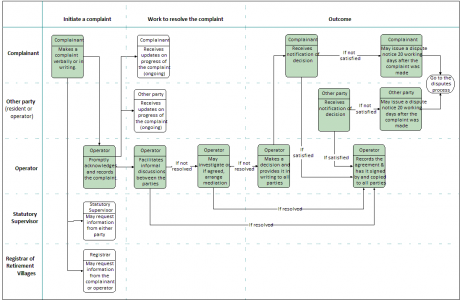Complaints
Retirement village residents may make a complaint and retirement village management must respond to any complaint and try to resolve it within 20 working days. The complaints process may include discussion, investigation, mediation and/or a decision. If a complaint is not resolved, it can be taken to a disputes panel.
- Complaints process
- Villages must have a complaint process
- Village operators must provide information
- Who can make a complaint
- 1. Making a complaint
- 2. Acknowledge the complaint
- 3. Try to resolve the complaint
- 4. Consider mediation
- 5. Make a decision on the complaint
- 6. Use the disputes process if necessary
Complaints process
You can view or download and print a copy of the complaints flowchart.
Complaints flowchart (PDF 46.91 KB, Sep 2013)

Villages must have a complaint process
The Retirement Villages Act requires each retirement village to have a written complaints procedure that enables complaints to be resolved simply, fairly and quickly (within 20 working days). The Code of Practice 2008 sets out the requirements for making, acknowledging and resolving complaints that all complaints procedures must meet. The complaints procedure must also include a way to decide complaints where complaints cannot be resolved through the complaints system.
The complaints procedure must state certain things including:
- That residents can ask the operator's contact person for information about their rights, and provide the contact details for that person
- That complaints do not have to be in writing and that the operator will record, acknowledge and respond to complaints in writing
- What the village's complaints procedure is and any other help the operator will give to residents
- That the complaint will be promptly acknowledged by the operator in writing
- That the operator will ensure the resident is regularly informed about the progress of their complaint
The full requirements for the complaints procedure are set out in clause 32 of the Code of Practice.
Village operators must provide information
The village operator is required to provide new or intending residents with the following information related to complaints and disputes:
- A copy of the Code of Residents' Rights. This must be given to intending residents with their disclosure statement. The village operator must also give a copy to a resident or intending resident if they ask for one.
- The contact details for the designated person the resident can contact with a complaint (included in the Code of Residents' Rights)
- Information about the village's complaints procedure and details of any other help the operator will provide to residents
- A copy of the Code of Practice to any resident or intending resident who asks for one
Who can make a complaint
A complaint can be made by a resident (or a number of residents):
- About an operator
- About another resident
The complaints and disputes provisions in the Retirement Villages Act may also be used by:
- A former resident
- The personal representative of a resident such as a family member or a friend
A resident may involve a support person to help, support or represent them through the complaints and disputes process. Lawyers can also be used to assist a resident through the process.
1. Making a complaint
A resident can make a complaint about the operator or about another resident verbally or in writing to the person designated in the Code of Residents’ Rights. The retirement village operator is required to record, acknowledge and respond in writing, whether the complaint is made in writing or verbally.
Residents can also make a complaint to the village’s statutory supervisor or to the Registrar of Retirement Villages about a breach of any right referred to in the Code of Residents Rights.
Residents can ask the designated contact person for a copy of the village's complaints procedure and for more information about their rights.
2. Acknowledge the complaint
The operator must promptly acknowledge the complaint in writing and ensure the complainant is regularly informed about the progress of the complaint.
3. Try to resolve the complaint
The operator works to promptly resolve the complaint. If the complaint is not resolved within 20 working days, then the complainant may be able to have the issue dealt with by a disputes panel (see Disputes for details).
The operator starts by enabling informal discussions to take place between the concerned parties. It may be necessary to do some investigation or research.
If the complaint is resolved by mutual agreement, then record the agreement and have it signed by and copied to all parties.
4. Consider mediation
If mutual agreement cannot be reached in informal discussions, the parties can consider mediation. Both parties must agree to using mediation. If the complaint is resolved by mutual agreement, then the operator records the agreement and has it signed by and copied to all parties.
A mediator can help the parties discuss the problem, identify the issues and come up with a workable solution.
Mediators are specialists in helping people resolve disputes. They are not necessarily lawyers, judges or counsellors. They are independent and unbiased. Mediators don’t decide anything, so it’s different to adjudication.
Mediators you can use include those listed on the following websites:
- Arbitrators' and Mediators' Institute of New Zealand (AMINZ) website
- Association of Dispute Resolvers (LEADR) website
- Building and Housing Group, Ministry of Business, Innovation and Employment website
5. Make a decision on the complaint
Where resolution is not possible, the operator makes a decision on the complaint following the steps in the village’s complaints procedure. Once the decision has been made, the operator notifies the decision in writing to all the parties.
The notification of the decision must include:
- The reasons for the decision
- Any action the operator intends to take as a result
- A statement that the parties are not bound by the decision
- A statement informing the resident of their right to issue a dispute notice if they're not satisfied with the decision and provided 20 working days have passed since the complaint was made. The dispute must also meet the criteria in section 53 of the Act.
See the disputes process.
6. Use the disputes process if necessary
If all parties are satisfied with the decision then the complaints process comes to an end.
If either of the parties is not satisfied, then they may choose to refer the dispute to a disputes panel by issuing a dispute notice to the other party once 20 working days have passed since the complaint was made.
If an operator has an issue with a resident that they have been unable to resolve despite making reasonable efforts, the operator may refer the dispute to a disputes panel 20 working days after they notified the resident of the dispute.
See the disputes process.
Related Information
Links related to this article:



